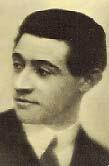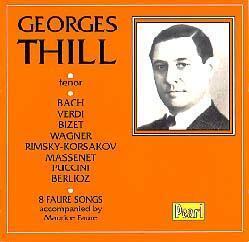Centennary of Tenor Georges Thill by Richard Turp
/ February 1, 1998
Version française...
 The year 1997 marked the centenary of
arguably the greatest French singer of the century, the tenor
Georges Thill. Born in Paris in 1897, he studied with the legendary
tenor Fernando De Lucia in Naples, which certainly accounts for the
fact that Thill is one of the few francophone singers who combines
an idiomatic French diction and stylistic sense with a so-called
"bel canto" vocal technique, based on the twin pillars of legato and
mezza voce. The year 1997 marked the centenary of
arguably the greatest French singer of the century, the tenor
Georges Thill. Born in Paris in 1897, he studied with the legendary
tenor Fernando De Lucia in Naples, which certainly accounts for the
fact that Thill is one of the few francophone singers who combines
an idiomatic French diction and stylistic sense with a so-called
"bel canto" vocal technique, based on the twin pillars of legato and
mezza voce.
He made his debut
at L’Opéra de Paris in 1924 as Nicias in Massenet’s Thais. By
the time he retired in 1956 he had performed most of the standard
roles of French and Italian opera in addition to several from the
Wagnerian operas that he loved so much. His repertory was vast,
comprising more than 50 leading roles. He was equally at ease in the
works of Bach and Gluck (his "Bannis la crainte" from Alceste
and "Unis dès la plus tendre enfance" from Iphigénie en
Tauride are required listening) as in the contemporary works of
Rabaud, Canteloube and Guinsbourg that he helped to create.
His career was centered on Paris (L’Opéra and L'Opéra-Comique)
but took him to Covent Garden, La Scala, New York’s Metropolitan and the Colón in Buenos Aires. He even found time to
make several films, including Abel Gance’s production of
Charpentier’s opera Louise with Grace Moore.
Metropolitan and the Colón in Buenos Aires. He even found time to
make several films, including Abel Gance’s production of
Charpentier’s opera Louise with Grace Moore.
Thill’s enormous discography (over 150 titles and several
complete operas) reflects not only the diversity of his art but his
genius. He was a master both of the lyrical phrase and the
voix-mixte (listen to his high C in "Salut! demeure chaste et pure"
from Gounod’s Faust) and of the heroic outpouring (as in
"Inutile regrets" from Les Troyens by Berlioz). He possessed
a luminous voice of rare beauty and homogeneity. In addition to
exemplary diction and phrasing, his singing demonstrated a quality
all-too-rare nowadays: irreprochable taste. Georges Thill simply had
class . . .
Two recordings demonstrate his talent. Pearl (GEMM CD 9947)
offers several essential Thill recordings: (Damnation de
Faust, Hérodiade, Carmen and Roméo et Juliette)
but also numerous debatable choices (such as French-language
excerpts from La Bohème and La Traviata and 8 Fauré
songs). The accompanying notes are equally suspect — he did not sing
only in French! — and as usual on Pearl, the technical reproduction
will not please everyone.
The choice of excerpts on the Bongiovanni label is not only more
representative of Thill but the transfers are more faithful and less
troubling than on Pearl. This Thill recording is part of an
interesting and precious series of historical recordings. Indeed the
whole series "Il mito dell’opera" continually surprises by the
excellence of its presentation and its vocal content.
Version française... | 

